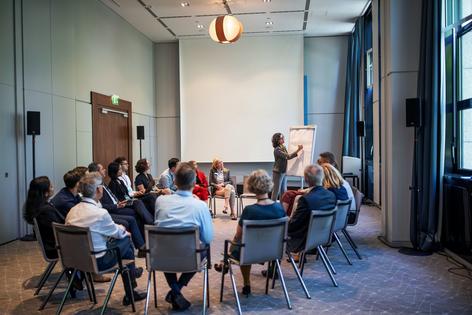Unconscious biases continue to hold back women in medicine, but research shows how to fight them and get closer to true equity and inclusion
Published in Health & Fitness
If you work at a company, university or large organization, you’ve probably sat through a required training session meant to fight gender and racial discrimination in the workplace. Employers increasingly invest in efforts to promote diversity, equity and inclusion – commonly referred to as DEI policies. Yet research shows these efforts often fail to address the implicit biases that often lead to discrimination.
I am a professor and a physician who has been working in university settings for over 30 years. I also study and speak about discrimination in medicine and science. Like most of my female colleagues, I have personally seen and experienced gender discrimination on many occasions throughout my career.
However, two things seem to have changed in recent years. First, modern training programs are starting to reflect decades of research on effective interventions. Second, I am noticing a gradual shift with people now more interested in actively addressing discrimination and harassment than ever before. Taken together, these changes give me hope that the medical profession is finally making progress on efforts to fight discrimination.
Many institutional policies outline anti-racist and anti-sexist goals, but research shows results have been slow in coming.
In a study I conducted to understand what continues to hold women back in their careers, I interviewed more than 100 men and women in academic medicine, including many in high-powered positions. In my study, dozens of interviewees told me stories of DEI policies that, even with the right intentions, failed to produce good results.
For example, frequently search committees are encouraged to broaden and diversify the pool of candidates for a position. In my study, I found that hiring committees often associate attempts to hire or promote a woman or member of an underrepresented group as “meeting a quota” or “affirmative action,” which the hiring committee sees as an imposition on their ability to choose the best candidates.
A male faculty member I interviewed claimed that a new colleague was hired “because she’s a woman,” even though she was as qualified for the position as other male candidates. Such reactions are part of why this approach, though commonly employed, has not fixed the problem of women getting fewer promotions than men.
It is also clear that blatant sexism is still present. For a study I published in 2021, I was told stories of a male department chair putting a dog leash on the desk of a female co-worker, and a female candidate for a leadership position being criticized by the chair of the search committee for not being “warm and fuzzy”.
Implicit bias is any unconscious negative attitude a person holds against a specific social group. These unconscious biases can affect judgment, decision making and behavior. Implicit bias is often one of the underlying issues that leads to discriminatory practices or harassment that DEI policies are meant to address.
Employee trainings are a staple of organizations’ efforts to meet diversity, equity and inclusion goals. Trainings can take various forms and cover a variety of topics, including implicit bias. These trainings, frequently done online, often “talk at” employees by simply offering information and directives rather than actively engaging them in discussion and analysis.
Trainings that fail to engage participants aren’t very effective in lessening imlicit bias. In fact, research has shown that some trainings suggest unconscious bias is an unchangeable fact of life and imply it can therefore be ignored.
Describing how bias works and how it influences individuals is an important step in addressing discrimination.
Researchers have been studying how unconscious bias works and how to mitigate it since the 1980s. These studies show that unconscious bias is a habit that can be broken over time with a clear, consistent and respectful series of evaluations, feedback and follow-ups. During this process, employees become more aware of bias in others, more likely to judge such bias as problematic and more able to mitigate bias in their own behavior. This type of intervention has been shown to produce measurable increases in the number of female faculty in science and medicine.
The question is whether the mandatory trainings and public messaging that are the staples of many DEI policies today can produce similar results to these intensive interventions.
Creating situations or a culture where people can and do share their experiences with harassment and discrimination – without risk of retaliation – can lead to increased awareness of bias in others and clear communication of the negative aspects of this bias.
One interviewee in my study talked about an exercise in which the women wrote down their experiences of discrimination and harassment and then the men read the women’s stories out loud. This woman felt that the men, by reciting the experiences of their female colleagues, finally began to understand how practices that seemed to be inclusive and fair were actively harming others.
Sharing personal experiences of harassment or discrimination with people who have biases is an understandably scary or intimidating thing to do – especially given the history of retaliation or shaming. But my recent experiences seem to suggest that the culture in medicine is shifting from one of avoidance to one of engagement.
I recently gave a talk on gender discrimination at a major cancer conference that brought together researchers from all across the U.S. I shared the results of my study as well as my personal experiences with the audience. At the end of my presentation, the crowd of men and women stood and applauded – a response I have rarely, if ever, seen in my 30 years of attending medical conferences.
This enthusiastic response may suggest that people are broadly becoming more open to and supportive of women and other underrepresented people sharing their own stories of facing discrimination. With a large body of research showing that sharing personal experiences with people who are actively listening and engaging is one of the most effective ways to combat unconscious bias, this standing ovation seemed to me a hopeful sign of things to come.
This article is republished from The Conversation, an independent nonprofit news site dedicated to sharing ideas from academic experts. If you found it interesting, you could subscribe to our weekly newsletter.
Read more:
Fishing, strip clubs and golf: How male-focused networking in medicine blocks female colleagues from top jobs
Men don’t trust female central bankers on inflation or the economy, survey data shows
Jennifer R. Grandis does not work for, consult, own shares in or receive funding from any company or organization that would benefit from this article, and has disclosed no relevant affiliations beyond their academic appointment.
















Comments